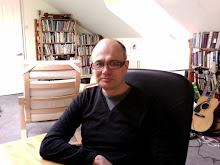Revd Mike Smith, in this week's Baptist Times attacks the recent review of the SPCK Book of Prayers and the whole notion of a 'book of prayers.' Smith attacks written prayer as un-Baptist, arguing that in attacking the Book of Common Prayer our Baptist ancestors were insisting that only extempore prayers were a genuine expression of the Holy Spirit. He ends his attack with a resounding call, "Don't let the written text crush the Spirit."
It is easy to respond with caricatures. I am sure that some people genuinely have a talent for extempore prayer and are able to express their deepest desires in eloquent words worthy of the creator of the universe. But even Mike Smith must admit that many - most - do not. Extempore prayer is, for the most part, dull and repetitious. Tired formulae are trotted out week after week, while intercessory prayer degenerates into a shopping list of unachievable dreams and platitudinous generalities. If I pray "God bless Mummy and Daddy," it will be impossible to prove whether God has answered my prayers or not, so I won't have to deal with the awkward silence of God.
Prepared prayer has the advantage of containing the author's crafted words, sculpted and shaped to fit the precise meaning and context out of which the author is writing. When it works, written, poetic prayer can take on a life beyond that intended by the author, just as any work of art takes on a meaning beyond that intended by the artist.
A collection of written prayers - such as the SPCK one, or, indeed Dancing Scarecrow, seeks to capture this and make it available beyond the confines of the context out of which it was written.
Mike Smith seems to deny the Holy Spirit any role in that process, limiting the Spirit's work to the unthought out and spontaneous. I beg to differ. The Spirit works beyond the confines of human imagining. Folk use the prayers on Dancing Scarecrow in contexts very different to our inner city Openshaw context and find that the Spirit gives our words new meanings beyond those we put into them in the first place. Most people choose not to use our material, but for some it is meaningful and helpful. That surely is the work of the Holy Spirit.
In attacking the Book of Common Prayer, it seems to me that our ancestors were not attacking the notion of written prayer. Rather, they were attacking the power and control which insisted that everyone had to use the same worship material. In publishing their Book of Prayers, which I confess I have not yet read, SPCK seem actually to be moving us away from this kind of control, giving us even more resources to choose from, to interpret and to use in our own context. Whether or not I find this particular collection helpful, I welcome its publication.
Tuesday, 10 August 2010
Subscribe to:
Posts (Atom)






